by Andrew Willis Garcés and Mackenzie Baris, with contributions by many others
Read previous reports: 2010, 2009, 2008, 2007
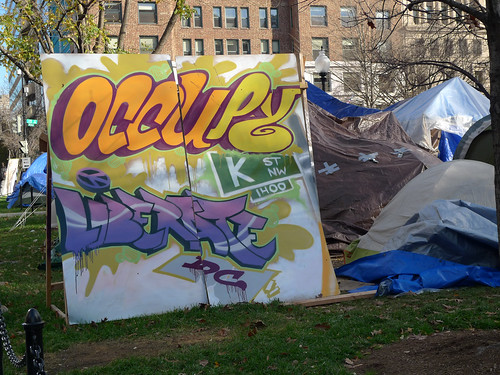 rn
rn
INDEX+ 2011 SNAPSHOT + Education & Youth + Gender Justice + Police & Criminal Justice + Immigrant Rights & Language Justice+ Labor & Workers+ Housing & Development+ Budget & Community Benefits
2011 SNAPSHOT
DC’S 99% PLANT SEEDS, CULTIVATE HUMAN ECONOMY
Facing a perennially corrupt and ineffective local government and several years of national bank bailouts for the 1%, DC change-makers turned to each other. Grassroots projects to create a human economy took off in 2011. The two Occupy DC** encampments churned out hundreds of free, daily meals and provided basic medical care and a library for hundreds of visitors, including some who had been recently laid off or evicted. Other volunteer-run projects like DC Doulas for Choice and DC Time Bank continued to expand opportunities for a human-centered, solidarity economy.rnrnJust a few other examples: A new grassroots, all-volunteer foundation — the Diverse City Fund — distributed $45,000 to 23 organizations led by people of color, and the long-running DC Abortion Fund stepped in when Congress blocked Medicaid abortion reimbursement. Several large housing coops consolidated and began to plan to play roles in spreading coop values & housing rights. New worker and consumer cooperatives began exploratory work, like a potential Shaw food coop, a GWU coop cafe, and cooperatives of day laborers and child care workers seeking greater control over their economic lives. And collective farming projects continued to take root in neighborhoods like Edgewood.
NEW YEAR, NEW MAYOR, MORE REASONS TO MOBILIZE
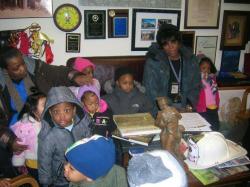 In 2011 a new mayor took office, welcomed his first week by children and parent members of Empower DC’s Childcare For All Campaign and the following week by River Terrace Elementary students who testified on plans to close their school. While action resulting in a temporary scuttling of closure plans, the end of the year found them back on the list.
In 2011 a new mayor took office, welcomed his first week by children and parent members of Empower DC’s Childcare For All Campaign and the following week by River Terrace Elementary students who testified on plans to close their school. While action resulting in a temporary scuttling of closure plans, the end of the year found them back on the list.
Although the City Council and mayor continue to create distracting corruption and ethics scandals — fresh out of a job as Pepco’s lobbyist, Vincent Orange even proposed to increase his own salary — activists were able to push through a critical new income tax on DC’s 1%, win an employment program targeted towards transgender residents and limit the ability of the police to collaborate with immigration enforcement officers, among other victories.
SOLIDARITY SPRING/SUMMER/FALL
In February, chanting “Free Egypt, Free DC,” hundreds joined local Egyptians and other Arab democracy activists in solidarity with uprisings in Africa and the Middle East. The solidarity fervor continued in March and April as nearly a dozen direct actions were organized in solidarity with the occupation of Wisconsin’s capitol building by people outraged at governor Scott Walker’s move to strip workers of the right to bargain collectively. And in October hundreds of residents rallied, marched and held sit-ins as part of the international campaign to stop Troy Davis’ execution by the state of Georgia. rnrnThis “report” isn’t intended to be comprehensive, but if you have a story of bottom-up community building uprooting systemic oppression, like the annual community cookout held by Friends & Family of Incarcerated People, let us know. And we’re happy to link to other similar report-backs.rnrn– AWG & MB (dreamcityreport@gmail.com)
** A note on language: There have been many thoughtful critiques of the term “occupy.” Here’s one from DC.
EDUCATION & YOUTH
SMART Presses For Multi-Lingual Justice at DCPS
Student Multi-ethnic Action Research Team – project of Many Languages, One Voice — continued to develop their campaign based on demands that students be allowed to participate in school activities without having to speak English (or experiencing other kinds of discrimination), being able to go to school without being mistreated because of their race, culture or accent, having access to interpretation and translation, and to have access to counselors and to healthy food. Student organizers, who facilitate monthly, multilingual meetings and larger summits with youth from three DCPS high schools, authored the first-ever “ELL Student Bill of Rights” and met several times with principals to press their agenda. Watch video
UDC Students Demand Chancellor Sessoms’ Resignation
In May UDC students organized to demand the resignation of Chancellor Allen Sessoms, who has been accused of profligate spending on travel at the same time proposing cuts to popular academic programs.
Youth Power Network Leaders Expand Campaigns Youth Power Network, part of the Washington Interfaith Network, kept the heat on in its second full year. In March, student leaders at Roosevelt High School, from YPN affiliate S.T.E.P. Up DC, held a 70-person action at their school as part of their Open the Front Door campaign. For the past 10+ years the front door entrance to Roosevelt has been closed for mysterious reasons. As a result, all students must use the back entrance to the school, meaning students must walk through a busy parking lot and past rows of dumpsters to enter the school. This has contributed to students being late for their morning classes and a general feeling of being disrespected. Since then, significant physical upgrades to the front door area have been made, and the front door is expected to be finally opened in early 2012. YPN youth and adult allies also knocked on more than 500 doors and spoke with over 165 families, merchants, and religious leaders in the Brightwood Park neighborhood of Northwest DC as part of “Roosevelt Rises!,” a campaign to reestablish the school as a community institution and presence in the neighborhood. And after an extensive listening process YPN’s leaders initiated a campaign to demand $7 million from the DC government to double the number of emergency shelter and temporary living beds for homeless youth, from 200 to 400, and is pushing for the city to invest $18 million of the DC’s government’s expected $85 million budget surplus to create 1,000 year-round paid internships for DC youth at local businesses.
GENDER JUSTICE
Transgender Activists Win Employment Program, Battle Impunity Against Violence From July to September at least 20 transgender women were assaulted in the District, including two who were killed. The group had previously delivered a list of priorities to the mayor’s Office on GLBT Affairs in May for achieving justice for transgender people. Following the violence the group and other transgender activists held a Trans Day of Action at the US Attorney’s Office and held meetings with high-ranking officials to press for greater protection for transgender DC residents. The group released the results of the first part of its community needs assessment, revealing that in addition to personal safety many transgender people lack access to healthcare and decent employment. And after intiating an employment-focused campaign in 2010, DCTC celebrated a big victory in August: Mayor Gray agreed to implement a jobs initiative targeted towards trans people.
AU Gender Justice Activists Demand Sexual Assault Funding In March several dozen American University students dropped banners in campus buildings and held a sit-in of the office of University Vice President Dr. Gail Short Hanson to demand the university sign-off on a Department of Justice grant application that could provide hundreds of thousands of dollars in funding for sexual assault prevention. The students ended the sit-in when they received a promise in writing to develop a comprehensive plan of action.
Activists Stage Anti-Street Harassment Demonstrations In June women and queer activists with Collective Action for Safe Spaces DC and others organized Our Streets, Too! A Big Queer/Feminist/Allies Street Fest, and in August, the worldwide “SlutWalk/Marcha de las Putas” anti-harassment movement arrived in the form of SlutWalk DC, demanding an end to sexual assault and the culture of victim-blaming.
In June women and queer activists with Collective Action for Safe Spaces DC and others organized Our Streets, Too! A Big Queer/Feminist/Allies Street Fest, and in August, the worldwide “SlutWalk/Marcha de las Putas” anti-harassment movement arrived in the form of SlutWalk DC, demanding an end to sexual assault and the culture of victim-blaming.
POLICE ACCOUNTABILITY & CRIMINAL JUSTICE
Many Speak Out Against Police Violence & Abuse In April, police shot and killed an unarmed man in the back as he was fleeing from them in Southeast. The following month police were caught on camera as they slammed an unarmed man in a wheelchair to the ground, reportedly for “refusing to leave the area” near the U Street Metro. And in July an 8-year veteran patrol officer was indicted for sexually assaulting three women at least six times over four years. MPD officers were involved in at least four fatal shootings, including shooting a man with a history of mental illness in Mt. Pleasant alone in an apartment. Also in July, seven officers released a man who had been identified as having assaulted two lesbian women in Columbia Heights, and refused to take their crime report until they went to the media and queer organizers protested. And in November police settled a lawsuit with the Rawlings family four years after DeÓnte Rawlings was killed by off-duty officers, for a “substantial” cash settlement. Transgender activists also continued to press the police and prosecutors to not ignore an increase in violent crimes against transgendered people.
Hundreds Mobilize in Solidarity with Troy Davis 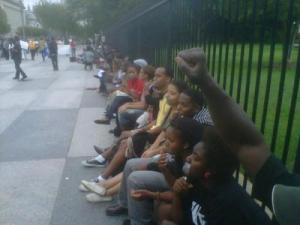 Hundreds of DC residents marched, rallied and sat-in at the White House to demand federal intervention in the case of Troy Davis, who was murdered by the State of Georgia in October. DC Troy Davis quickly formed and has held several community education events and direct actions, including a joint effort with an Occupy DC committee demonstrating against Wells Fargo’s investment in private prisons.
Hundreds of DC residents marched, rallied and sat-in at the White House to demand federal intervention in the case of Troy Davis, who was murdered by the State of Georgia in October. DC Troy Davis quickly formed and has held several community education events and direct actions, including a joint effort with an Occupy DC committee demonstrating against Wells Fargo’s investment in private prisons.
IMMIGRANT RIGHTS & LANGUAGE JUSTICE
DC Pushes Forward on Immigrant Rights In August the Department of Homeland Security announced that they would make their so-called “Secure Communities” program mandatory for all communities by 2013. Less than a year before, a broad coalition of immigrant, labor, civil rights, domestic violence, community, faith, and student organizations had come together to make DC the first city in the country to withdraw their agreement with DHS and terminate the dangerous S-Comm program, which automatically sends fingerprints of everyone arrest to ICE. Following the announcement that this program would now come to DC whether the city wanted it or not, the coalition that fought S-Comm sprung back into action, organizing an education day at the Wilson Building to explain the implications of the new national policy to the DC Council and Mayor’s Office and push for decisive action to protect DC residents. On October 19th, Mayor Gray signed an executive order re-affirming and clarifying the District’s long-standing policy that city officials will not inquire into the immigration status of individuals or transmit information about immigration status to federal agencies except when that status pertains directly to a criminal investigation. The order directs District public-safety officials not to detain individuals on the basis of immigration status and bars District agencies from making incarcerated youth and adults under their supervision available for federal immigration interviews without a court order. In November, Councilmember Mendelson introduced a bill that builds upon and strengthens the Mayor’s Executive Order by limiting the access ICE has to people being held in the DC Jail. The bill was unanimously co-sponsored by all 13 Councilmembers and has the support of a broad coalition, making it likely to pass early in 2012. Both the Executive Order and legislation make DC a leader in the national movement to turn the tide against anti-immigrant measures and strengthen equal protection of immigrant community members.
Many Languages, One Voice Keeps Up Language Access Accountability In its first official year as “MLOV” the group released the first-ever “State of Language Access in DC” report, began housing an initiative to integrate occupational health and safety and language access for the District’s nail salon workers and business owners and began developing a healthcare justice project. MLOV also hosted several community-building and education events, and continued to resource SMART’s high school organizers. As the centering body of the Language Access Coalition the group also participated in meetings with Language Access Coordinators at 33 different government agencies.
ECONOMIC JUSTICE, LABOR & WORKERS
Occupy DC Mobilizes Hundreds 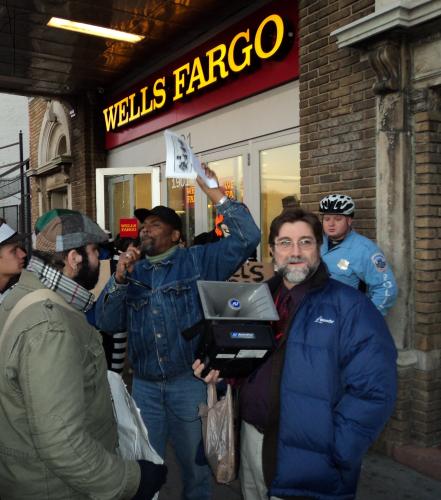 Much can be written about the efforts of hundreds of people who have since October participated in two downtown occupations; this paragraph will not do it justice. The organizing has included many active working groups printing newspapers, serving meals and organizing dozens of actions, many supportive of established local grassroots organizations. The Action Working Group continues to carry out direct actions in solidarity with national and local organizations on issues from workers’ rights to affordable housing, including the Communication Workers of America, Washington Teachers’ Union, Service Employees International Union, Respect DC, ONE DC, and many more. Political education and skill trainings took place almost daily at McPherson Square, and members of the People of Color Working Group worked to center the conversation at Occupy K St towards the communities of color who remain DC’s majority and those hit hardest by economic policies, and to Decolonize DC. Others occupied the former Franklin Shelter, which Mayor Fenty famously closed down and which has since been a target for real estate speculators.
Much can be written about the efforts of hundreds of people who have since October participated in two downtown occupations; this paragraph will not do it justice. The organizing has included many active working groups printing newspapers, serving meals and organizing dozens of actions, many supportive of established local grassroots organizations. The Action Working Group continues to carry out direct actions in solidarity with national and local organizations on issues from workers’ rights to affordable housing, including the Communication Workers of America, Washington Teachers’ Union, Service Employees International Union, Respect DC, ONE DC, and many more. Political education and skill trainings took place almost daily at McPherson Square, and members of the People of Color Working Group worked to center the conversation at Occupy K St towards the communities of color who remain DC’s majority and those hit hardest by economic policies, and to Decolonize DC. Others occupied the former Franklin Shelter, which Mayor Fenty famously closed down and which has since been a target for real estate speculators.
DC Jobs or Else Wins New Construction Jobs for DC Residents Demanding stronger local hiring commitments, hundreds of DC residents — largely from Ward 8 — held several direct actions on local construction sites, including blocking trucks from entering the Department of Homeland Security construction site ($4.3 billion of new construction) and marching twice across the 11th St Bridge ($330 million), another site with few DC workers. The actions forced a dialogue about how to increase the number of DC residents at the Homeland Security project on future phases of construction, and led to the immediate hiring of DC residents. 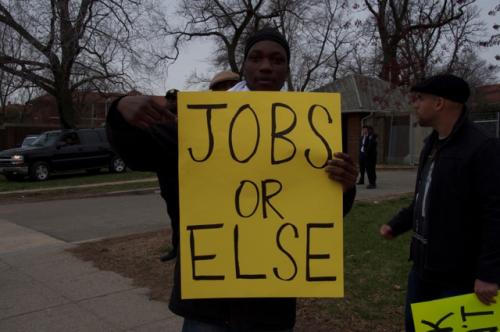 And by exposing problems on the bridge project related to discrimination and the lack of local hiring, the DC Water Board made clear to the contractor that it expects it to hire DC residents on its multi-year tunnel construction project. As a result, over half of the workers on the tunnel project are DC residents. Going into 2012 DC Jobs or Else plans to aggressively monitor any project that has the new First Source Hiring Requirements placed on it. Those contractors not in compliance will be targets of more direct actions.
And by exposing problems on the bridge project related to discrimination and the lack of local hiring, the DC Water Board made clear to the contractor that it expects it to hire DC residents on its multi-year tunnel construction project. As a result, over half of the workers on the tunnel project are DC residents. Going into 2012 DC Jobs or Else plans to aggressively monitor any project that has the new First Source Hiring Requirements placed on it. Those contractors not in compliance will be targets of more direct actions.
ONE DC Campaign Wins a Seat on Marriott Hotel Jobs Committee ONE DC’s new Right to Live and Work in DC Campaign set its sights on winning jobs for over 500 DC unemployed and underemployed residents at the Marriott’s new hotel under construction in downtown DC. Now ONE DC will be on the Committee to oversee the jobs created as a result of the First Source Agreement which mandates that 51% of new jobs at the hotel go to DC residents. ONE DC will launch a recruitment campaign in early 2012 to identify DC residents especially from Wards 2, 7 & 8 who want to organize for workers rights and justice and continue to pressure Marriott to make good on its commitment.
Georgetown Dining Hall Workers Win Union Aramark workers at Georgetown University organized during 2011 to win both a union and strong first contract. The effort received critical support from members of Georgetown Solidarity Committee, who had begun building relationships with workers two years before. Students led outreach to workers during the underground organizing campaign, and organized broader support from the University community once workers went public with their demands. Students and workers held discussions in secret for over a year to protect workers from losing their jobs. And unlike in most union campaigns, no professional organizers were involved, though student and worker leaders received training and guidance from UNITE HERE. In January of 2011, workers leaders had their first meeting with student, faculty and community supporters and were ready to take their effort public. In February, members of the workers’ committee held a blitz, visiting co-workers at home to ask them to sign a union card. Within the first three days, we had over half the workers signed up, eventually building to 87 percent. Faced with overwhelming support from workers for a union and solidarity from students and faculty, Aramark certified the union on March 29th and workers began to meet to discuss their first contract.
Nurses Take on DC’s Biggest Hospital and Win 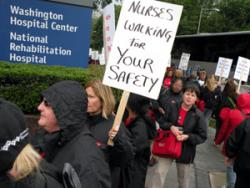 1,650 registered nurses began 2011 locked in battle with DC’s largest hospital, Washington Hospital Center. The nurses, represented by National Nurses United union, were pushing the hospital to address serious patient safety problems and nursing standards at the hospital, while management was attempting to cut nurses’ pay and benefits. Nurses charged that Washington Hospital Center, which is owned by the MedStar Health chain, had been eroding patient care conditions and prompted an exodus of hundreds of experienced RNs from the hospital. On March 4th, nurses announced a one-day walk-out. Washington Hospital Center responded by locking the nurses our for another four days. Union members, students, and community members converged from across the city to keep the nurses company and swell constant picket lines outside the hospital. After returning to work, nurses kept up a vigorous campaign throughout the Spring both inside and outside the hospital. On May 9th, just as nurses were preparing for another round of picketing, they reached an agreement with the hospital for a contract that includes a new staffing matrix to increase the number of nurses at the bedside and a new Professional Practice Committee to address and solve issues related to patient care and staffing issues. The new agreement also raises most nurses’ hourly base rate wages between 8.5% and 9.0% over three and a half years and restores the differential pay for nurses who work evenings, nights, and weekends. Finally, the agreement included a return to work for eight nurses unjustly fired during the back-to-back snow storms in February 2010.
1,650 registered nurses began 2011 locked in battle with DC’s largest hospital, Washington Hospital Center. The nurses, represented by National Nurses United union, were pushing the hospital to address serious patient safety problems and nursing standards at the hospital, while management was attempting to cut nurses’ pay and benefits. Nurses charged that Washington Hospital Center, which is owned by the MedStar Health chain, had been eroding patient care conditions and prompted an exodus of hundreds of experienced RNs from the hospital. On March 4th, nurses announced a one-day walk-out. Washington Hospital Center responded by locking the nurses our for another four days. Union members, students, and community members converged from across the city to keep the nurses company and swell constant picket lines outside the hospital. After returning to work, nurses kept up a vigorous campaign throughout the Spring both inside and outside the hospital. On May 9th, just as nurses were preparing for another round of picketing, they reached an agreement with the hospital for a contract that includes a new staffing matrix to increase the number of nurses at the bedside and a new Professional Practice Committee to address and solve issues related to patient care and staffing issues. The new agreement also raises most nurses’ hourly base rate wages between 8.5% and 9.0% over three and a half years and restores the differential pay for nurses who work evenings, nights, and weekends. Finally, the agreement included a return to work for eight nurses unjustly fired during the back-to-back snow storms in February 2010.
Office Cleaners Win Better Wages The men and women who work cleaning offices in the DC metro area perform their jobs each day with grace and dignity, but often go unrecognized and don’t receive pay and benefits equal to their hard work. This fall, 12,000 members of the Service Employees of America (SEIU) members went into bargaining with the Washington Service Contractors Association demanding better benefits and pay, but also fair workloads and the creation of more full-time jobs. SEIU 32BJ members organized within their workplaces, but also in the community, leafletting at metro stops during rush hour to educate the people who work in the buildings they clean. DC Jobs with Justice organized communtiy support, launching an online petition, getting news about negotiations out to tenants and residents, and collecting endorsements from community and faith leaders. The campaign gained the support of dozens of community organizations, as well as from elected officials in DC, Maryland and Virgina. On October 12th, just days before the contract was set to expire, cleaners and their community and political supporters gathered in force for a huge rally and march through downtown DC. The rush hour march, swelled by supporters from Occupy K Street and many others, shut down K Street as the crowd chanted “si se puede, yes we can!” The street heat worked, and on Oct. 16th SEIU 32BJ came to an agreement with the employers for a new contract that will give workers more paid sick and vacation days and a 4% wage increase.
Verizon Workers Strike to Defend Good Jobs 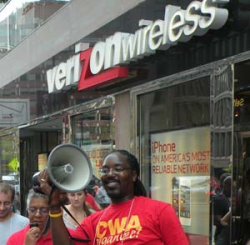 On Sunday August 5th, 45,000 Communication Workers of America (CWA) members on the east coast went on strike against communication giant Verizon. Within 24 hours of the strike notice, CWA members and supporters around the country began picket lines in front of Verizon service locations. Community allies like DC Jobs with Justice immediately joined the fray once the strike was called and began walking the picket lines alongside workers. On the very first day of the strike community activists and members of UNITE HERE and Organization United for Respect at Walmart joined CWA members for a picket line at a downtown Verizon Wireless store. Throughout August CWA members held down daily worksite pickets, while labor, community, and student allies organized actions at Verizon Wireless stores to increase the pressure. By August 23rd, Verizon was buckling under community pressure and unable to keep operations going during the strike. CWA members ended the strike and returned to work and the bargaining table. But the return to the table has not meant the end of the struggle: Verizon continues to demand deep concessions from its workers, including freezing pensions for active employees and eliminating them for new workers, slashing disability benefits for workers injured on the job, and imposing health care payments of up to $6,800 on active employees. Community support for the CWA members has not wavered since the end of the strike. Leafletting continues regularly at Verizon Wireless stores to educate consumers about Verzion’s labor practices and students, Puppet Underground, and members of Occupy DC held creative solidarity actions to draw attention and escalate pressure.
On Sunday August 5th, 45,000 Communication Workers of America (CWA) members on the east coast went on strike against communication giant Verizon. Within 24 hours of the strike notice, CWA members and supporters around the country began picket lines in front of Verizon service locations. Community allies like DC Jobs with Justice immediately joined the fray once the strike was called and began walking the picket lines alongside workers. On the very first day of the strike community activists and members of UNITE HERE and Organization United for Respect at Walmart joined CWA members for a picket line at a downtown Verizon Wireless store. Throughout August CWA members held down daily worksite pickets, while labor, community, and student allies organized actions at Verizon Wireless stores to increase the pressure. By August 23rd, Verizon was buckling under community pressure and unable to keep operations going during the strike. CWA members ended the strike and returned to work and the bargaining table. But the return to the table has not meant the end of the struggle: Verizon continues to demand deep concessions from its workers, including freezing pensions for active employees and eliminating them for new workers, slashing disability benefits for workers injured on the job, and imposing health care payments of up to $6,800 on active employees. Community support for the CWA members has not wavered since the end of the strike. Leafletting continues regularly at Verizon Wireless stores to educate consumers about Verzion’s labor practices and students, Puppet Underground, and members of Occupy DC held creative solidarity actions to draw attention and escalate pressure.
HOUSING & DEVELOPMENT
Norwood Tenants Form DC’s Newest Housing Co-op Six years ago, the residents of 1417 N St NW united to form a tenant association with the goal of improving their housing conditions. Today they are owners of their 84-unit building which is now committed, long-term affordable housing. 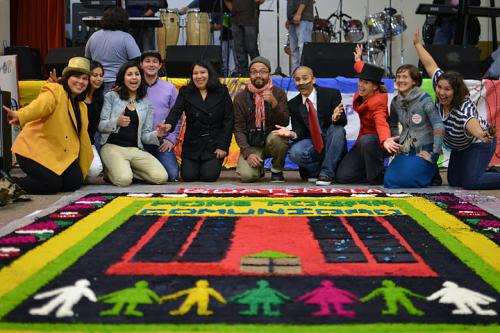 Organizing with the support of the Latino Economic Development Corporation, their struggle involved suing the owner for poor housing conditions, defeating a condominium conversion proposal, and ultimately led to the purchase of their building and the creation of DC’s newest affordable cooperative. Residents credit their success to leveraging the creativity and energy of the diverse tenants in everything from creating a Twitter feed to incorporating Mayan art into their organizing. In their tradition, the cooperative will continue to organize with the broader tenant community and ensure that low income tenants in DC build power!rnNorwood Co-op Board and community organizers from LEDC in front of the Mayan Mosaic, “Home, Hogar, Community” celebrating the cooperative purchase.
Organizing with the support of the Latino Economic Development Corporation, their struggle involved suing the owner for poor housing conditions, defeating a condominium conversion proposal, and ultimately led to the purchase of their building and the creation of DC’s newest affordable cooperative. Residents credit their success to leveraging the creativity and energy of the diverse tenants in everything from creating a Twitter feed to incorporating Mayan art into their organizing. In their tradition, the cooperative will continue to organize with the broader tenant community and ensure that low income tenants in DC build power!rnNorwood Co-op Board and community organizers from LEDC in front of the Mayan Mosaic, “Home, Hogar, Community” celebrating the cooperative purchase.
Neighbors Organize to Demand Respect from Walmart 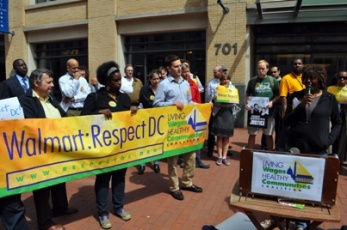 Towards the end of 2010, Walmart announced plans to build not one but four stores in the District of Columbia. Residents started organizing across the city in response, kicking off 2011 with a new citywide coalition, the Living Wages, Healthy Communities coalition, demanding a citywide enforceable community benefits agreement from Walmart before they be allowed to open a single store anywhere in DC. The Respect DC campaign hit the streets, knocking on doors every weekend in the places where Walmart planned to open, attending community meetings, educating neighbors, making phone calls, holding rallies, meeting with elected officials and and building momentum to put community pressure on Walmart with the message that DC cannot trust their promises. In Ward 4, a new group of residents called Ward 4 Thrives adamantly opposed Walmart at the intersection of Georgia and Missouri, and organized to make sure developer Foulger-Pratt and Councilmember Muriel Bowser heard those community voices. A similar group formed in Ward 5, and in Wards 6 and 7 Advisory Neighborhood Commissions formed special committees to work to influence the conditions of Walmart’s opening. Residents took the campaign directly to Walmart, with a flash mob at their store in Laurel, a rally outside a fundraiser that Rob Walton was attending, and a delegation to one of their board members. The campaign succeeded in changing the dialogue about what benefits, and harms, Walmart would bring to DC and in giving neighborhood residents the tools to talk community benefits. Walmart had to counter with its own “Community Partnership Agreement,” putting in writing the vague promises they had been making to communities all year. While the Mayor and Council may have been taken in by this non-agreement, and Walmart has added two new proposed stores, for a total of SIX in DC, residents across the city ended the year still fighting back, and a new association of Walmart workers, Organization United for Respect, was gaining strength at stores in Maryland and Virginia, promising that Walmart won’t have an easy time in 2012.
Towards the end of 2010, Walmart announced plans to build not one but four stores in the District of Columbia. Residents started organizing across the city in response, kicking off 2011 with a new citywide coalition, the Living Wages, Healthy Communities coalition, demanding a citywide enforceable community benefits agreement from Walmart before they be allowed to open a single store anywhere in DC. The Respect DC campaign hit the streets, knocking on doors every weekend in the places where Walmart planned to open, attending community meetings, educating neighbors, making phone calls, holding rallies, meeting with elected officials and and building momentum to put community pressure on Walmart with the message that DC cannot trust their promises. In Ward 4, a new group of residents called Ward 4 Thrives adamantly opposed Walmart at the intersection of Georgia and Missouri, and organized to make sure developer Foulger-Pratt and Councilmember Muriel Bowser heard those community voices. A similar group formed in Ward 5, and in Wards 6 and 7 Advisory Neighborhood Commissions formed special committees to work to influence the conditions of Walmart’s opening. Residents took the campaign directly to Walmart, with a flash mob at their store in Laurel, a rally outside a fundraiser that Rob Walton was attending, and a delegation to one of their board members. The campaign succeeded in changing the dialogue about what benefits, and harms, Walmart would bring to DC and in giving neighborhood residents the tools to talk community benefits. Walmart had to counter with its own “Community Partnership Agreement,” putting in writing the vague promises they had been making to communities all year. While the Mayor and Council may have been taken in by this non-agreement, and Walmart has added two new proposed stores, for a total of SIX in DC, residents across the city ended the year still fighting back, and a new association of Walmart workers, Organization United for Respect, was gaining strength at stores in Maryland and Virginia, promising that Walmart won’t have an easy time in 2012.
4th Annual Tenant Town Hall DC Tenants came together for the 4th Annual Tenant Town Hall, organized by the Latino Economic Development Corporation, which brought together more than 250 tenants in addition to Councilmembers, DC housing agency directors and Mayor Gray. The Town Hall is the culmination of tenant organizing around DC’s housing budget where tenant association and cooperative leaders spoke out for restoring the affordable housing budget. 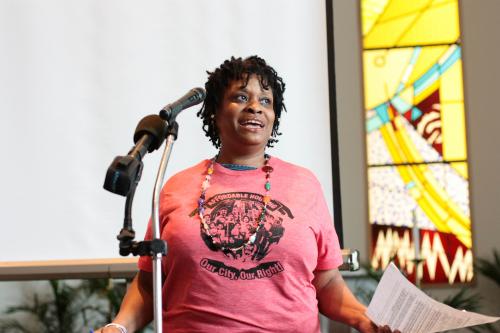 Tenant leaders at the Town Hall spoke from personal experience to advocate for the campaign priorities – an institutional process for low-income residents to influence the DCRA’s inspection and enforcement process and full funding for tenant purchase. DCRA committed to meeting with tenant stakeholders and incorporating feedback and numerous Councilmembers committed to support a restoration of tenant purchase funds. Tenant leaders will be working hard this spring to ensure these commitments are fulfilled.
Tenant leaders at the Town Hall spoke from personal experience to advocate for the campaign priorities – an institutional process for low-income residents to influence the DCRA’s inspection and enforcement process and full funding for tenant purchase. DCRA committed to meeting with tenant stakeholders and incorporating feedback and numerous Councilmembers committed to support a restoration of tenant purchase funds. Tenant leaders will be working hard this spring to ensure these commitments are fulfilled.
Grassroots Development Planning on Georgia AvernThe Georgia Ave Task Force, founded in Dec. 2009, works to unify community institutions like businesses and nonprofits together with community residents towards greater community participation in the development of Lower Georgia Ave. The group has in the past conducted an inventory of current businesses and abandoned buildings, interest surveys and a formal community development review process. In 2011 the Task Force reviewed and supported the draft Howard University Campus Plan, and continued to monitor other development projects. The group also focused attention on its priorities with a Council candidate’s forum in March, and in June installed two 60-foot-long (bilingual) maps of Lower Georgia Ave at Bruce Monroe Park depicting current and proposed development projects. The Task Force also kicked off community initiatives such as the Georgia Avenue Window Walk which connected local artists to vacant properties, leading to two art installations at 2702 and 2902 Georgia Ave. Plans for 2012 include Healthy Corner Stores which will encourage corner stores to carry fresh produce and Bulk Energy Buying for businesses along Georgia Ave to reduce energy costs. Other possibilities include a food co-op and community composting. The Task Force can be reached via taskforce@ecacollective.org
Franklin Shelter Re-Opened/Occupied  Inspired by new energy for reclaiming public resources for public use, in November housing activists and Occupy DC supporters briefly reopened Franklin Shelter, which has sat vacant for two years, waiting through a second mayoral administration with plans to sell it off to a private developer. The action was coupled with a community dialogue sponsored by Empower DC, ONE DC, DC Jobs with Justice and the Washington Peace Center on creating vibrant downtown community spaces through better use of Franklin and other public spaces. A follow-up was set for early 2012.
Inspired by new energy for reclaiming public resources for public use, in November housing activists and Occupy DC supporters briefly reopened Franklin Shelter, which has sat vacant for two years, waiting through a second mayoral administration with plans to sell it off to a private developer. The action was coupled with a community dialogue sponsored by Empower DC, ONE DC, DC Jobs with Justice and the Washington Peace Center on creating vibrant downtown community spaces through better use of Franklin and other public spaces. A follow-up was set for early 2012.
BUDGET & COMMUNITY BENEFITS
Save Our Safety Net-DC Scores New High-Income Taxes, Pushes Back Cuts In its second year of campaigning to increase taxes on high-income earners to avoid safety net budget nuts, SOS-DC scored an unexpected early victory. After a series of “Let’s Do Lunch” lunchtime actions designed to force Mayor Gray to make an early commitment to “new taxes now” (he declined to speak publicly), the pressure paid off: his budget sent to the Council included new taxes on taxpayers making over $200,000/yr. But he also proposed $187 million in cuts, 57% of those cuts to human services.  SOS built on partnerships with groups like Empower DC, LEDC, ONE DC and Jews United for Justice and a strong base in high-income and middle-class communities developed over the previous year and kicked off a number of public actions on individual councilmembers, like a “reality tour” rnof the Wilson Building to dramatize the impacts of the cuts, tours of neighborhoods impacted by cuts, a “race to restore budget cuts” and a “sleep-in” with leadership by tenants of subsidized housing. Dozens of Ward 3 residents also singled out Mary Cheh, whose ward has the most high-income earners. The activists’ pressure resulted in over $30 million in funding restorations, and a new tax on out-of-state bond investments. And then in September, facing a new shortfall and after 18 months of public actions demanding new taxes, the City Council agreed to raise taxes on residents making over $350,000/yr by .5%, which is projected to generate $100 million for safety net programs by 2015. You can read a longer description of the campaign here.
SOS built on partnerships with groups like Empower DC, LEDC, ONE DC and Jews United for Justice and a strong base in high-income and middle-class communities developed over the previous year and kicked off a number of public actions on individual councilmembers, like a “reality tour” rnof the Wilson Building to dramatize the impacts of the cuts, tours of neighborhoods impacted by cuts, a “race to restore budget cuts” and a “sleep-in” with leadership by tenants of subsidized housing. Dozens of Ward 3 residents also singled out Mary Cheh, whose ward has the most high-income earners. The activists’ pressure resulted in over $30 million in funding restorations, and a new tax on out-of-state bond investments. And then in September, facing a new shortfall and after 18 months of public actions demanding new taxes, the City Council agreed to raise taxes on residents making over $350,000/yr by .5%, which is projected to generate $100 million for safety net programs by 2015. You can read a longer description of the campaign here.
Shaw Community Keeps Control of Benefits Fund In 2005 ONE DC won a community benefits agreement with the developers and the city for what used to be known as Parcel 33, and is now Progression Place (7th & S St NW). The Community Benefits Agreement requires a Community Benefits Fund which is to put $ 750,000 into community related activities to benefit Shaw residents. ONE DC has won a seat on the Community Benefits Agreement Committee for Parcel 33/Progression Place and is committed to keeping the community informed of how the funds are dispensed and watchdog that the 51 units of affordable housing actually go to DC residents and preferably displaced members of the Shaw community.
